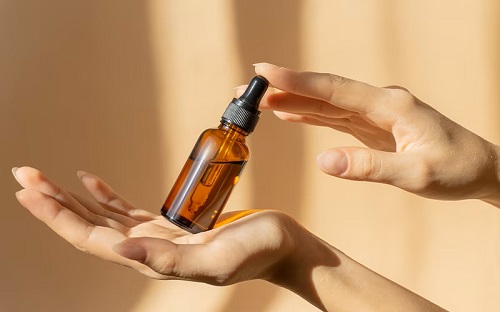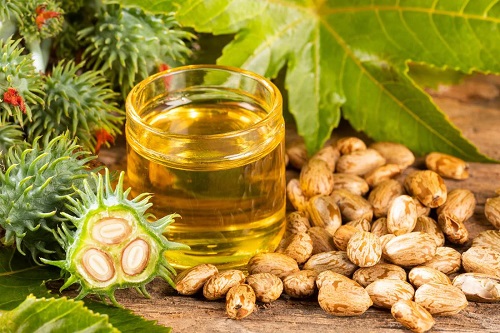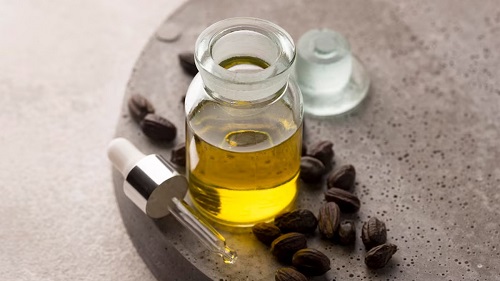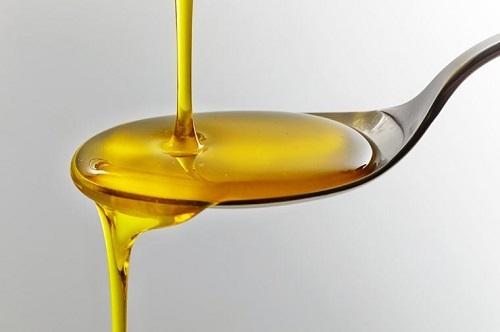Does Castor Oil Go Bad Over Time? Discover the spoilage signs and some quick storage tips to ensure its longevity!

Castor oil has become incredibly popular in the beauty and wellness world, with its wide range of uses and purported benefits. However, one burning question is on many people’s minds: Does Castor Oil Go Bad Over Time? If you are one among them, this comprehensive guide is what you are looking for!
Have a look at Where to Buy Castor Oil? here
Chemical Composition of Castor Oil and Stability
The chemical composition of castor oil plays a critical role in its long-term stability and resistance to spoilage. The oil predominantly comprises ricinoleic acid, which accounts for about 90% of its fatty acid content. This monounsaturated fatty acid contributes to the oil’s robust stability and longer shelf life than those rich in polyunsaturated fats.
The presence of minor amounts of oleic (2-6%) and linoleic acids(1-5%) also impacts the oil’s longevity, but given their smaller proportion, their effect is minimal. Overall, the high concentration of ricinoleic acid makes castor oil less susceptible to oxidation and rancidity, extending its usability over time.
Discover some Super Effective Castor Oil Soap Recipes here
Does Castor Oil Go Bad Over Time?
Certainly, castor oil does have a limited shelf life, despite its relatively stable composition. Extracted from the seeds of the Ricinus communis plant, castor oil can last anywhere from 2 to 5 years when unopened and stored under optimal conditions.
This extended longevity is largely due to its unique fatty acid profile, with ricinoleic acid, granting the oil moderate resistance to oxidation.
However, the shelf life diminishes once the container is opened; the oil’s beneficial qualities are retained for approximately a year before deteriorating due to air, heat, and light exposure.
So, in answering, Does Castor Oil Go Bad Over Time—Yes, it does, albeit at a slower rate compared to oils with a higher proportion of polyunsaturated fats.
Learn about the Flammability of Castor Oil here
Signs of Castor Oil Spoilage
Recognizing the signs of deterioration will ensure you’re not using an expired product, which could be less effective and compromise its intended applications.
- Odor Changes: A significant change in odor is often the first clue. Fresh castor oil has a mild, somewhat nutty, or earthy aroma. If the oil develops a rancid or sour smell, it indicates that the oil has begun to oxidize and should not be used.
- Color and Clarity: Fresh castor oil typically has a clear, pale yellow appearance. If you notice that the oil has discolored to a darker hue or has become cloudy, it’s a sign that the oil’s quality has declined. This is often due to the breakdown of the fatty acids and potential microbial growth.
- Altered Texture: The consistency of fresh castor oil should be smooth and relatively thin. Observing a thicker, lumpier texture indicates spoilage or crystallization, often occurring due to prolonged exposure to low temperatures or air.
- Presence of Mold: Though uncommon due to castor oil’s antimicrobial properties, mold can still develop, especially if the oil has been contaminated using unclean applicators or stored in a humid environment. Mold is a definitive sign that the oil should be discarded immediately.
Get some Expert Castor Oil Buying Tips here
Quick Castor Oil Storage Tips
- Opt for a dark-colored glass bottle or jar with an airtight lid to protect the oil from light and air.
- Keep the oil at a stable room temperature, ideally between 60-75°F (15-24°C).
- Mark the date of purchase and the date of opening on the bottle to keep track of its age and expected shelf life.
- Consider refrigerating the oil in hot or humid climates to extend its shelf life. This can make the oil thicker, so it may require warming before use.
- If using the oil for cosmetic or medicinal applications, consider using a dropper or spatula to prevent contamination from fingers or other sources.
- Periodically examine the oil for changes in smell, color, and texture to ensure it remains in good condition.
- Keep the oil separated from strong-smelling substances or chemicals to avoid cross-contamination.
Does Castor Oil Freeze? Learn here
Key Takeaways
The longevity and quality of castor oil are deeply influenced by its unique chemical composition. Ricinoleic acid grants the oil a comparatively longer shelf life—up to 5 years when stored correctly. However, once opened, its effective lifespan shortens to about a year due to potential oxidation from air, heat, and light.
Recognizing the signs of spoilage, such as a change in odor, color, or texture, can prevent the usage of deteriorated oil, which can be less effective or harmful. Overall, while castor oil is relatively stable, proper storage and regular quality checks are essential to extend its shelf life and maintain its effectiveness.
FAQs
1. Does Castor Oil Expire?
Castor oil does have a shelf life and can eventually expire due to oxidation. While it has a relatively long shelf life compared to other oils, monitoring signs of degradation is essential.
2. What Are the Signs of Expired Castor Oil?
Expired castor oil might exhibit changes in color, smell, and texture. It could become darker, and cloudy and develop an off-putting odor. The texture might thicken or become grainy.
3. Can Expired Castor Oil Be Used for Other Purposes?
It’s best to avoid using expired castor oil, even for other purposes. Ingesting or applying expired oil could lead to digestive discomfort, skin irritation, or other adverse reactions.
4. What Does Expired Castor Oil Look Like?
Expired castor oil may appear cloudy, murky, or sediment-like. It can darken and lose its initial clarity, indicating degradation.
5. What Will Happen if You Use Expired Castor Oil?
Using expired castor oil might lead to reduced effectiveness. Changes in its composition could result in less desirable outcomes, such as ineffectiveness in skincare or haircare applications and potential skin irritation.




